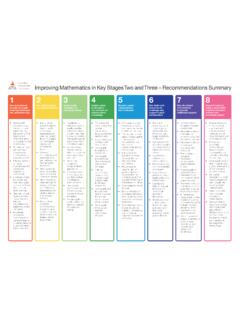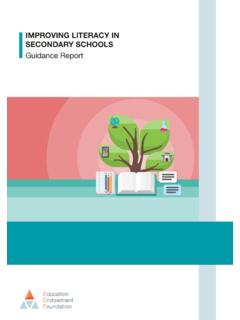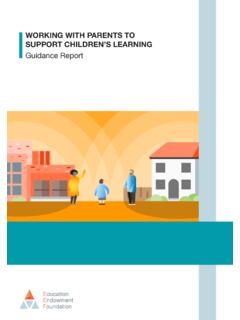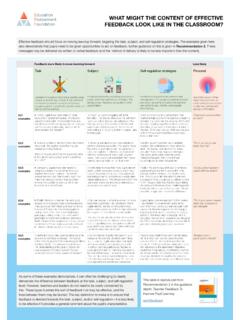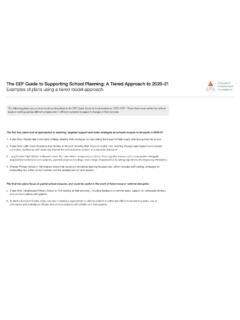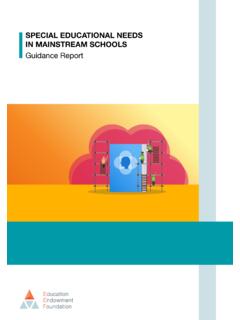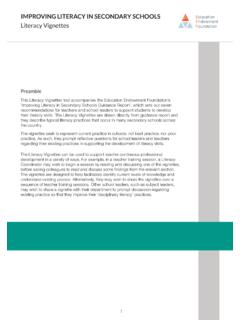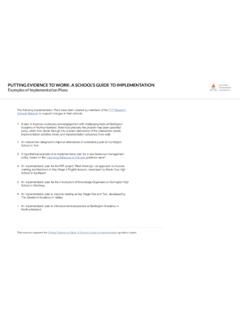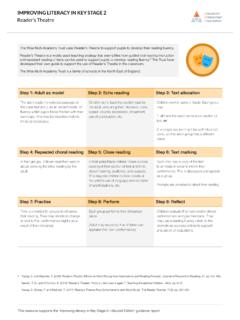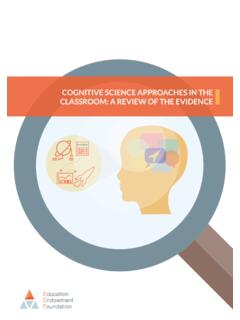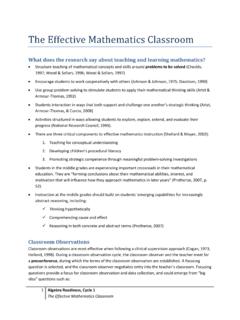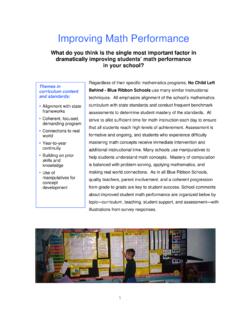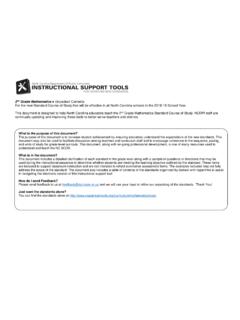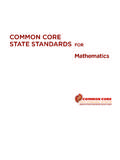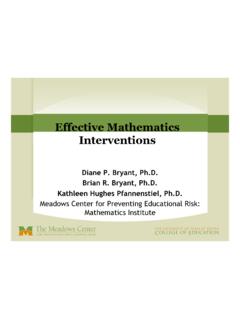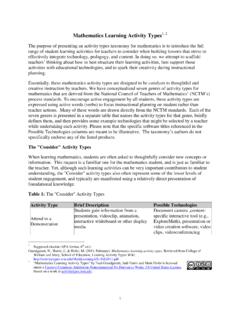Transcription of IMPROVING MATHEMATICS IN KEY STAGES TWO AND THREE
1 Education EndowmentFoundatio nIMPROVING MATHEMATICS IN KEY STAGES TWO AND THREE Guidance ReportMATHEMATICSMThis guidance report was written by Peter Henderson (EEF), Prof Jeremy Hodgen (University College London Institute of Education), Dr Colin Foster (University of Nottingham) and Dietmar Kuchemann (University of Nottingham). The authors were supported by an Advisory Panel, which consisted of Clare Christie (Ashley Down Schools Federation), Sally Freeman (Prestbury St. Mary s school), Prof Jeremy Hodgen (University College London Institute of Education), Nikki Jones (Shireland Collegiate Academy), and Prof Anne Watson (University of Oxford).
2 The guidance was based on a review of the research evidence conducted by Prof Jeremy Hodgen (University College London Institute of Education), Dr Colin Foster (University of Nottingham), Dr Rachel Marks (University of Brighton), and Prof Margaret Brown (King s College London). The EEF would like to thank the many other researchers and practitioners who provided support and feedback on drafts of this guidance. Education Endowment Foundation IMPROVING MATHEMATICS in Key STAGES Two and THREE CONTENTSF oreword Introduction Summary of recommendations Recommendations Recommendation 1 Use assessment to build on pupils existing knowledge and understanding Recommendation 2 Use manipulatives and representations Recommendation 3 teach strategies for solving problems Recommendation 4 Enable pupils to develop a rich network of mathematical knowledge Recommendation 5 Develop pupils
3 Independence and motivation Recommendation 6 Use tasks and resources to challenge and support pupils MATHEMATICS Recommendation 7 Use structured interventions to provide additional support Recommendation 8 Support pupils to make a successful transition between primary and secondary schoolHow was this guidance compiled? Glossary References 2368101416202428303132342 Education Endowment Foundation IMPROVING MATHEMATICS in Key STAGES Two and THREE FOREWORDL eaving school with a good GCSE in maths is a prerequisite for progressing into quality jobs, apprenticeships, and further education.
4 The skills we learn at school help us with everyday life too. Yet too many of our young people do not make the grade and, as a result, risk social and economic exclusion. These pupils are disproportionately drawn from disadvantaged homes. Last year, over half of those eligible for free school meals had not achieved the expected level in English and maths by age 16. That s one in two young people from low-income households who are automatically denied access to secure and well-paid careers, as well as to further study. This is not just a personal tragedy for the individual; it s a waste of talent on a national scale and a huge barrier to IMPROVING social truly break this link between family income and educational attainment, we have to start early and make sure that all young people regardless of background have access to great maths teaching in primary and secondary school.
5 At the Education Endowment Foundation, we believe the best way to do this is through better use of evidence: looking at what has and has not worked in the past can put us in a much better place to judge what is likely to work in the future. But it can be difficult to know where to start. There are thousands of studies of maths teaching out there, most of which are presented in academic papers and journals. Teachers are inundated with information about programmes and training courses too, all of which make claims about impact. How can anyone know which findings are the most secure, reliable, and relevant to their school and pupils?
6 This is why we ve produced this guidance report. It offers eight practical, evidence-based recommendations that are relevant to all pupils but particularly to those struggling with their MATHEMATICS . To develop the recommendations, we reviewed the best available international research and consulted experts, teachers, and academics to arrive at key principles for effective hope this report will help to support consistently excellent, evidence-informed maths teaching in England that creates great opportunities for all children, regardless of their family background. It is a starting point for a more evidence-informed approach to teaching maths and the EEF and its partners, particularly our network of Research Schools, will be producing a range of supporting resources, tools, and training to help you implement the recommendations in your Kevan CollinsChief ExecutiveEducation Endowment FoundationEducation Endowment Foundation IMPROVING MATHEMATICS in Key STAGES Two and Three3 INTRODUCTIONWHAT DOES THIS GUIDANCE COVER?
7 This guidance report focuses on the teaching of MATHEMATICS to pupils in Key STAGES 2 and 3. The decision to focus on these Key STAGES was made after an initial consultation period with teachers, academics, and other stakeholders. The consultation suggested that these were areas where guidance could make a big impact as not only are schools seeking advice on adjusting to a new curriculum, there is also concern about pupils making a transition between the STAGES . This report is not intended to provide a comprehensive guide to MATHEMATICS teaching. We have made recommendations where there are research findings that schools can use to make a significant difference to pupils learning, and have focused on the questions that appear to be most salient to practitioners.
8 There are aspects of MATHEMATICS teaching not covered by this guidance. In these situations, teachers must draw on their knowledge of MATHEMATICS , professional experience and judgement, and assessment of their pupils knowledge and focus is on IMPROVING the quality of teaching. Excellent maths teaching requires good content knowledge, but this is not sufficient. Excellent teachers also know the ways in which pupils learn MATHEMATICS and the difficulties they are likely to encounter, and how MATHEMATICS can be most effectively The guidance draws on a review of the evidence on effective maths teaching conducted by Prof Jeremy Hodgen, Dr Colin Foster, and Dr Rachel Marks.
9 As such, it is not a new study in itself, but rather is intended as an accessible overview of existing research with clear, actionable guidance. More information about how this guidance was created is available at the end of the IS THIS GUIDANCE FOR?This guidance is aimed primarily at subject leaders, headteachers, and other staff with responsibility for leading improvements in MATHEMATICS teaching in primary and secondary schools. Classroom teachers and teaching assistants will also find this guidance useful as a resource to aid their day-to-day teaching. It may also be used by: governors and parents to support and challengeschool staff; programme developers to inform their developmentof both professional development for teachers andinterventions for pupils; and educational researchers to conduct further testingof the recommendations in this guidance, and fill ingaps in the Endowment Foundation IMPROVING MATHEMATICS in Key STAGES Two and THREE INTRODUCTION CONTINUEDACTING ON THE GUIDANCEWe recognise that the effective implementation of these recommendations such that they make a real impact on children is both critical and challenging.
10 There are several key principles to consider when acting on this guidance. Professional Development (CPD) will be an important component of implementation and is key toraising the quality of teaching and teacher knowledge. A summary of the best available evidence regardingCPD is available from the Teacher Development Trust.* recommendations do not provide a one size fits all solution. It is important to consider the delicatebalance between implementing the recommendations faithfully and applying them appropriately in a school sparticular context. Implementing the recommendations effectively will therefore require careful consideration ofcontext as well as sound professional is important to consider the precise detail provided beneath the headline recommendations.
